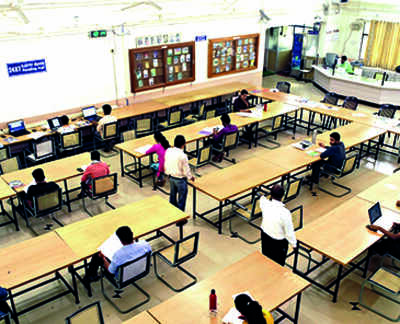- News
- City News
- hubballi News
- E-library at UAS a big draw among students and faculty
E-library at UAS a big draw among students and faculty
Synopsis
In a world tending increasingly towards digital education, the University of Agricultural Sciences (UAS), Dharwad appears to be eager to keep step with the times.

Hubballi: In a world tending increasingly towards digital education, the University of Agricultural Sciences (UAS), Dharwad appears to be eager to keep step with the times. To that end, the varsity has recast its library as a high-tech digital knowledge hub, which will provide students access to an exhaustive list of sources on the internet. The new ‘virtual library’ will have books published by international companies that one is hard-put to find in Indian stores, thereby offering students the chance to considerably widen their knowledge in their chosen field of study.
The UAS library houses nearly 1.3 lakh books, in addition to 244 journals in print, while students can also access 200 Indian journals online, in addition to 25 foreign ones. So far, the varsity has uploaded 5,860 dissertations on the ‘Krishikosh’ database of the Indian Council of Agricultural Research. The varsity’s e-library counts more than 2,500 teachers, students and scientists among its members.
The virtual library at UAS, Dharwad was unveiled by vice-chancellor Prof MB Chetti in 2021. UAS, Dharwad librarian HB Babalad told TOI, “Following the outbreak of Covid-19, the library was closed, and faculty and students alike did not have access to books and journals. In order to overcome this problem and ensure uninterrupted learning, the varsity decided to develop infrastructure for a virtual library. The number of users browsing through the digitised books has only been growing since it was launched last year.”
Perhaps the best feature of the e-library is the integrated platform it offers to students, who do not have to travel between sites to get the books they need. “Journals on agriculture are provided to all the campuses, by sharing the IP address. The library runs almost automatically, since it was developed using the ‘SLIM-21’ software,” Babalad said.
Soumya Patil, a research associate, said that that the e-library had helped her gain access to many papers published in various peer-review journals. “We had to pay a small sum to access papers in journals earlier, but following the launch of the e-library, we can read any journal we want online. This facility has been really very beneficial for the students,” said Soumya, adding that each member was provided an ID to access the virtual library.
Sagar Dhage, a researcher pursing PhD in agronomy at UAS, Dharwad, said that referring previously published articles was vital to the entire process. “The e-library ensures that we can get access to all the journals and magazines from the world over,” Dhage said.
The UAS library houses nearly 1.3 lakh books, in addition to 244 journals in print, while students can also access 200 Indian journals online, in addition to 25 foreign ones. So far, the varsity has uploaded 5,860 dissertations on the ‘Krishikosh’ database of the Indian Council of Agricultural Research. The varsity’s e-library counts more than 2,500 teachers, students and scientists among its members.
The virtual library at UAS, Dharwad was unveiled by vice-chancellor Prof MB Chetti in 2021. UAS, Dharwad librarian HB Babalad told TOI, “Following the outbreak of Covid-19, the library was closed, and faculty and students alike did not have access to books and journals. In order to overcome this problem and ensure uninterrupted learning, the varsity decided to develop infrastructure for a virtual library. The number of users browsing through the digitised books has only been growing since it was launched last year.”
Perhaps the best feature of the e-library is the integrated platform it offers to students, who do not have to travel between sites to get the books they need. “Journals on agriculture are provided to all the campuses, by sharing the IP address. The library runs almost automatically, since it was developed using the ‘SLIM-21’ software,” Babalad said.
Soumya Patil, a research associate, said that that the e-library had helped her gain access to many papers published in various peer-review journals. “We had to pay a small sum to access papers in journals earlier, but following the launch of the e-library, we can read any journal we want online. This facility has been really very beneficial for the students,” said Soumya, adding that each member was provided an ID to access the virtual library.
Sagar Dhage, a researcher pursing PhD in agronomy at UAS, Dharwad, said that referring previously published articles was vital to the entire process. “The e-library ensures that we can get access to all the journals and magazines from the world over,” Dhage said.
FOLLOW US ON SOCIAL MEDIA
FacebookTwitterInstagram
Looking for Something?

Start a Conversation
end of article
Visual Stories
Quick Links
Delhi Air PollutionDelhi TemperatureChennai WeatherBangalore TemperatureCovid vaccination centres in DelhiCoronavirus in DelhiRTPCR test in GurgaonHyderabad RainPollution level in BangaloreDelhi SmogDelhi TemperatureNoida AQIGurgaon AQI todayFire in MumbaiMumbai RainsCovid 19 RT PCR Test in NoidaDelhi AQI todaySrinagar encounter

